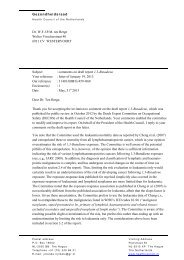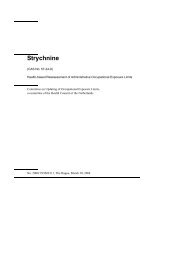Health Council of the Netherlands Reports 2003 - Gezondheidsraad
Health Council of the Netherlands Reports 2003 - Gezondheidsraad
Health Council of the Netherlands Reports 2003 - Gezondheidsraad
You also want an ePaper? Increase the reach of your titles
YUMPU automatically turns print PDFs into web optimized ePapers that Google loves.
and <strong>of</strong> <strong>the</strong> interaction between genes and <strong>the</strong> environment. The many genetic<br />
differences that exist between individual human beings also apply in <strong>the</strong> case <strong>of</strong><br />
<strong>the</strong> ‘disease genes’. All human beings have genes that can trigger disease<br />
processes in <strong>the</strong>mselves and in <strong>the</strong>ir <strong>of</strong>fspring. Increasingly <strong>of</strong>ten, it is possible to<br />
provide specific counselling on those processes. It is also important for <strong>the</strong> public<br />
to know that <strong>the</strong> effect <strong>of</strong> genes is almost always influenced by o<strong>the</strong>r factors,<br />
which are referred to collectively as “<strong>the</strong> environment” . These factors include<br />
diet and lifestyle. Awareness <strong>of</strong> <strong>the</strong>se issues underlines <strong>the</strong> individual<br />
responsibility <strong>of</strong> <strong>the</strong> citizen. Besides possessing certain specific knowledge, it is<br />
desirable that people should know how to go about asking for genetic<br />
counselling.<br />
The question <strong>of</strong> what knowledge <strong>the</strong> public actually has <strong>of</strong> genetics is not an<br />
easy one to answer. Research in this area is not only scarce, but it is also open to<br />
criticism with regard to <strong>the</strong> methodology employed. Experience gained in <strong>the</strong><br />
field <strong>of</strong> clinical genetics teaches us that <strong>the</strong> heritability <strong>of</strong> disease is a<br />
misunderstood concept. Thus it appears that some people do not seek counselling<br />
in spite <strong>of</strong> <strong>the</strong> fact that <strong>the</strong>re is a history <strong>of</strong> a particular disease in <strong>the</strong>ir family.<br />
As far as <strong>the</strong> initiatives that are needed in order to raise public awareness are<br />
concerned, <strong>the</strong> focus is placed on education, general information and <strong>the</strong> position<br />
<strong>of</strong> <strong>the</strong> general practitioner. An obvious dichotomy arises in <strong>the</strong> sphere <strong>of</strong><br />
education. Only a proportion <strong>of</strong> pupils – i.e. those who opt to take a course in<br />
biology – are informed about genetics. However, adequate public awareness<br />
demands that <strong>the</strong> o<strong>the</strong>rs must also gain an insight into this issue – something<br />
which could probably be accomplished through <strong>the</strong> use <strong>of</strong> simple examples. This<br />
requires consultation between educational experts, geneticists and <strong>of</strong>ficials from<br />
<strong>the</strong> relevant ministries.<br />
Fur<strong>the</strong>rmore, <strong>the</strong> public at large needs to have access to general information.<br />
As far as hereditary diseases are concerned, it is possible to consult a general<br />
practitioner. Discussion between clinical geneticists and GPs could improve this<br />
process. Information can also be provided via <strong>the</strong> internet, which entails making<br />
<strong>the</strong> public aware <strong>of</strong> informative websites. One such site is <strong>the</strong> Erfocentrum, a<br />
genetic resource and information centre to be found at www.erfelijkheid.nl. The<br />
dissemination <strong>of</strong> information to ethnic minorities is an issue that warrants special<br />
attention. Research has shown that child mortality within this population group is<br />
substantially higher than <strong>the</strong> national average in <strong>the</strong> Ne<strong>the</strong>rlands, with hereditary<br />
diseases being an important contributory factor.<br />
36 <strong>Health</strong> <strong>Council</strong> <strong>of</strong> <strong>the</strong> Ne<strong>the</strong>rlands; <strong>Reports</strong> <strong>2003</strong>

















